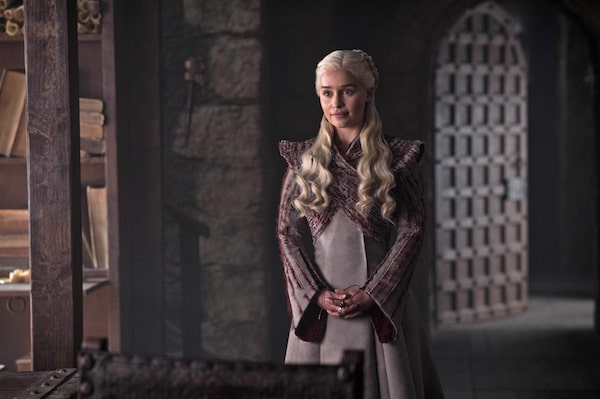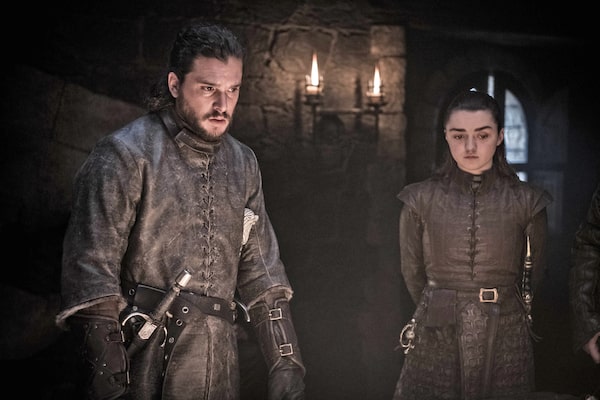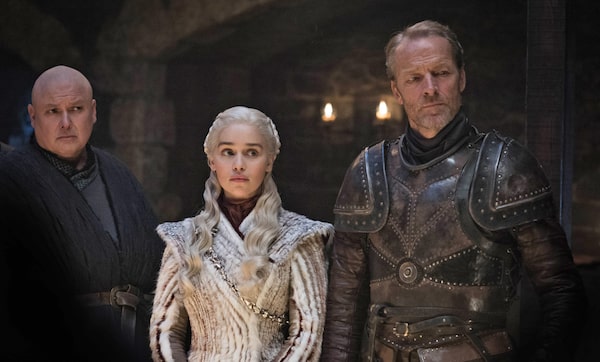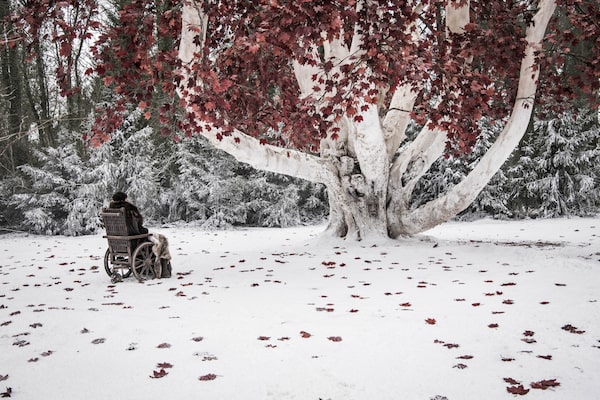
Emilia Clarke as Daenerys Targaryen.HBO
The great thing about pondering the final season of a television phenomenon is that it affords all kinds of opportunities to think of other series that have either reached, or should’ve reached by now, the final hour. That’s one of the many thoughts, at least, that I juggled in my head while watching the absorbing, touching, necessary, but also wobbly “A Knight of the Seven Kingdoms,” the second episode of Game of Thrones’ last season.
Game of Thrones guide: Catch up on Season 8 episode reviews
There was the scene early on, for instance, in which Tyrion dryly uttered the lament, “So we’re going to die at Winterfell” – a moment that unintentionally evoked a classic sight gag from an early episode of The Simpsons (the pregnancy pamphlet, “So You’ve Ruined Your Life”). There was the unlikely gathering of friends and foes around Winterfell’s worst jug of wine that felt like a postapocalyptic version of Cheers, with Tormund swilling giant’s milk from a ram’s horn with as much casual indifference as Norm would chug a mug of beer. (I suppose Jaime would be this world’s version of Sam, though I’m open to Davos filling that role.) And there was the coupling of Arya and Gendry, a match I didn’t anticipate but makes sense in a Pacey-Joey-from-Dawson’s-Creek kind of way.

Kit Harington as Jon Snow and Maisie Williams as Arya Stark.HBO
Perhaps I was searching, and sometimes stretching, for these comparisons as a means of distraction, though. Because while "A Knight of the Seven Kingdoms" did all the right things, it also served as a reminder of the pain of finality, and the inherent awkwardness of saying goodbye.
Game of Thrones has been working toward this last stretch for the past eight years, and the series now feels severely aware of its limited time left. So before the show got down to the brutish business of battle – the Night King’s zombie army was approaching Winterfell just a little less slowly than usual this episode, set to arrive at Winterfell before sunrise, a.k.a. next episode – it would use this opportunity to catch up, and linger, with old friends for one last sentimental, rambling goodbye.
Which is how we got an hour of television that was Game of Thrones playing to its strengths, and tripping on its weaknesses. On the former matter, there’s no question that the show has produced dozens – hundreds? – of indelible characters. These are men and women (and mythical beasts) who shouldn’t provoke so many dizzying feelings, yet leap from the screen all the same. Winterfell’s castle was chock full of them on Sunday evening, as the Hound swapped drinks with Beric, Theon made amends with Sansa, Dolorous Edd cracked wise with Sam, Jaime knighted Brienne, and Bran continued to freak everyone the hell out. Most of this was touching, and some of it – namely the look of Brienne’s face as Jaime uttered the words, “Rise, Brienne of Tarth, a knight of the Seven Kingdoms” – felt worth the entire eight-season experience of GoT itself.

Jaime Lannister played by Nikolaj Coster Waldau.HBO
But a good chunk of it also acted as a reminder of the challenge the show faces in offering all those wonderful characters an appropriate farewell, and how its solution to this problem is often eye-rolling dialogue. In the GoT world, people say what they mean, and they don’t say it subtly. Are you curious as to what Dany might be thinking in regards to her feelings for Jon? Don’t worry, she’ll spill, and spell, them out verbatim. Ditto Jaime’s feelings for Brienne, or Sam’s insistence that his spirit is as battle-ready as anyone’s. Even Tyrion, who gets the show’s juiciest lines, often utters exactly what the audience expects of him. We know he’s clever because he is constantly telling us he is so very clever.
As “A Knight of the Seven Kingdoms” unfolded last night – and it became clear the episode would be an entirely Winterfell-set edition, with no appearances from Cersei or her elephant-less Golden Company – it became difficult to separate feelings from fact. As in: These beloved characters have been on such an emotional journey that I want to spend as much time with them as possible and hear everything they have to say to one another – but why does it all have to be so yeah-yeah-I-get-it obvious?

Lord Varys played by Conleth Hill, Emilia Clarke as Daenerys Targaryen in centre, and Iain Glen as Ser Jorah Mormont.HBO
This tendency toward bluntness sparks fears that the final hour of this series will spend its time in a similar fashion. Likely, the next three episodes will deal with two battles – the one which pits the living against the dead in the battle for Westeros, the other which pits the living against each other in the battle for the Iron Throne – which means the finale could devolve into a similar flood of obvious let-me-tell-you-how-I-really-feel dialogue and extended character catch-up. The Lord of the Rings comparisons are obvious, but there is a real danger GoT could go out on a Return of the King ending, in which there are too many endings to cram in that none of them feels satisfactory.
Then again, this concern could be moot by the time next week’s episode wraps up. Everyone spends so much time in “A Knight of the Seven Kingdoms” wondering what will happen after Winterfell’s battle against the Night King that no one (save Bran) seems to consider that there might not be any sort of afterward at all. If last night’s episode was goodbye, it was as compelling and problematic as Game of Thrones has always been.

Isaac Hempstead Wright as Bran Stark.HBO
 Barry Hertz
Barry Hertz